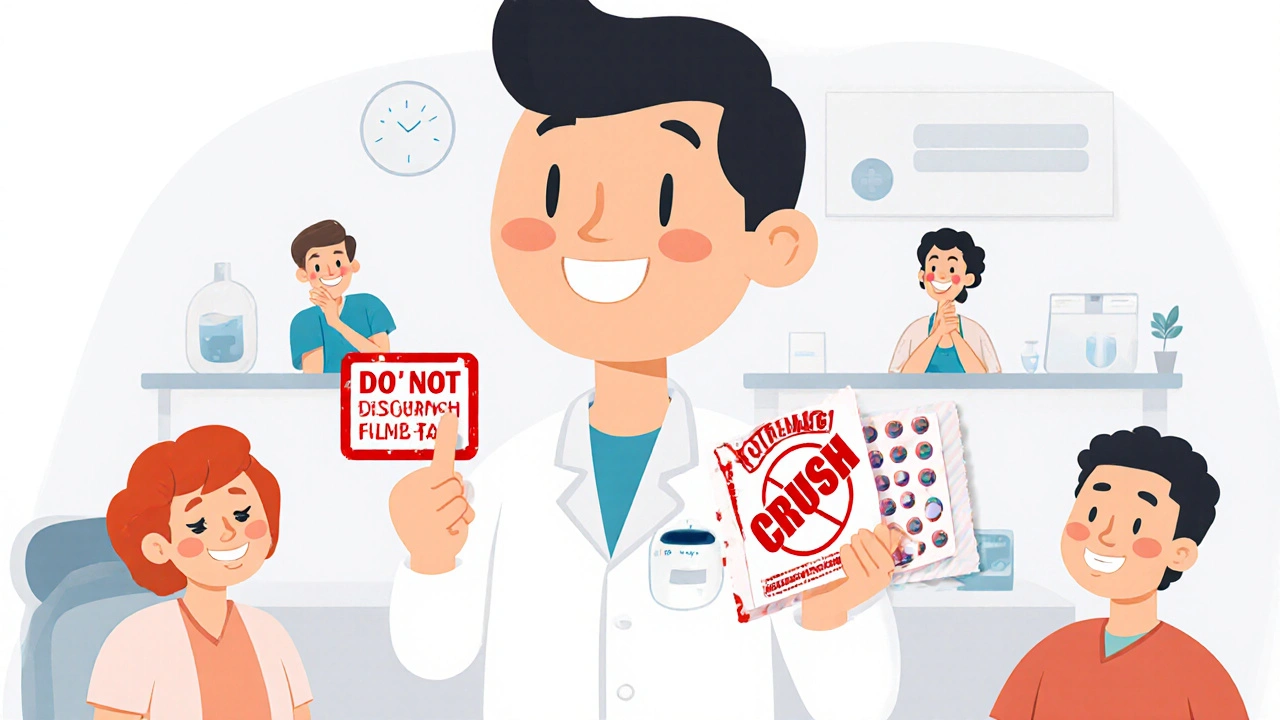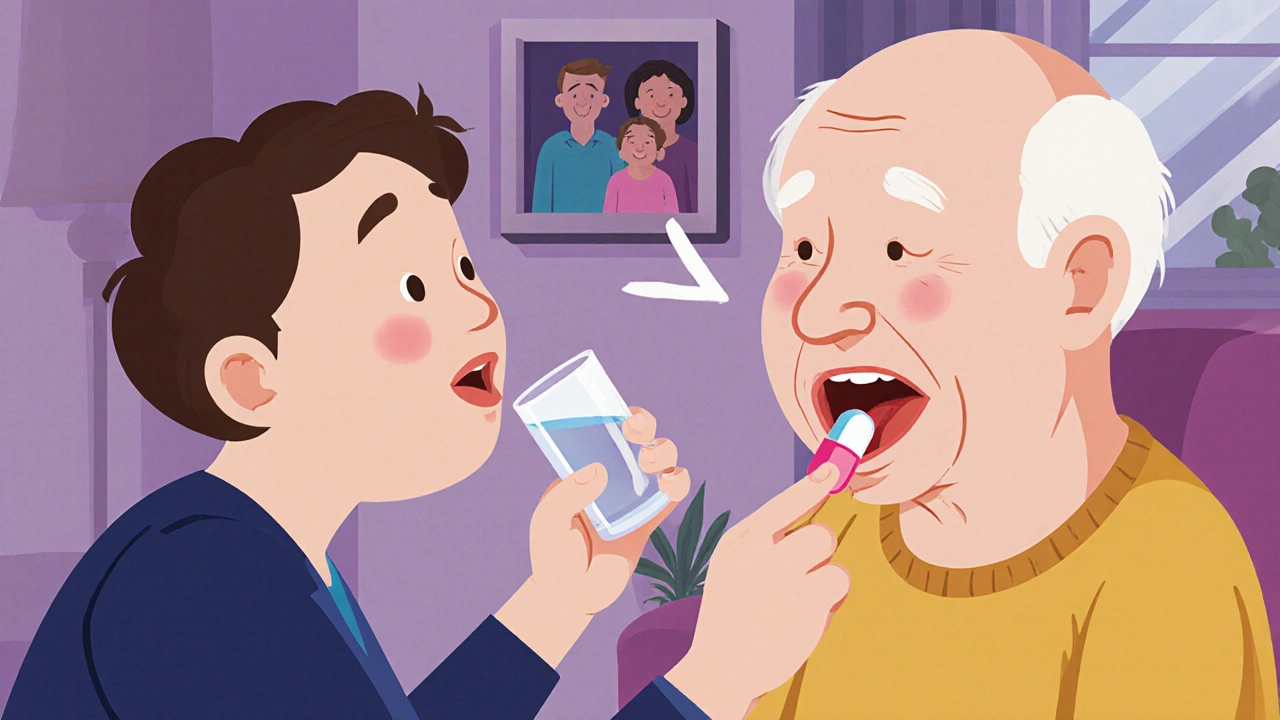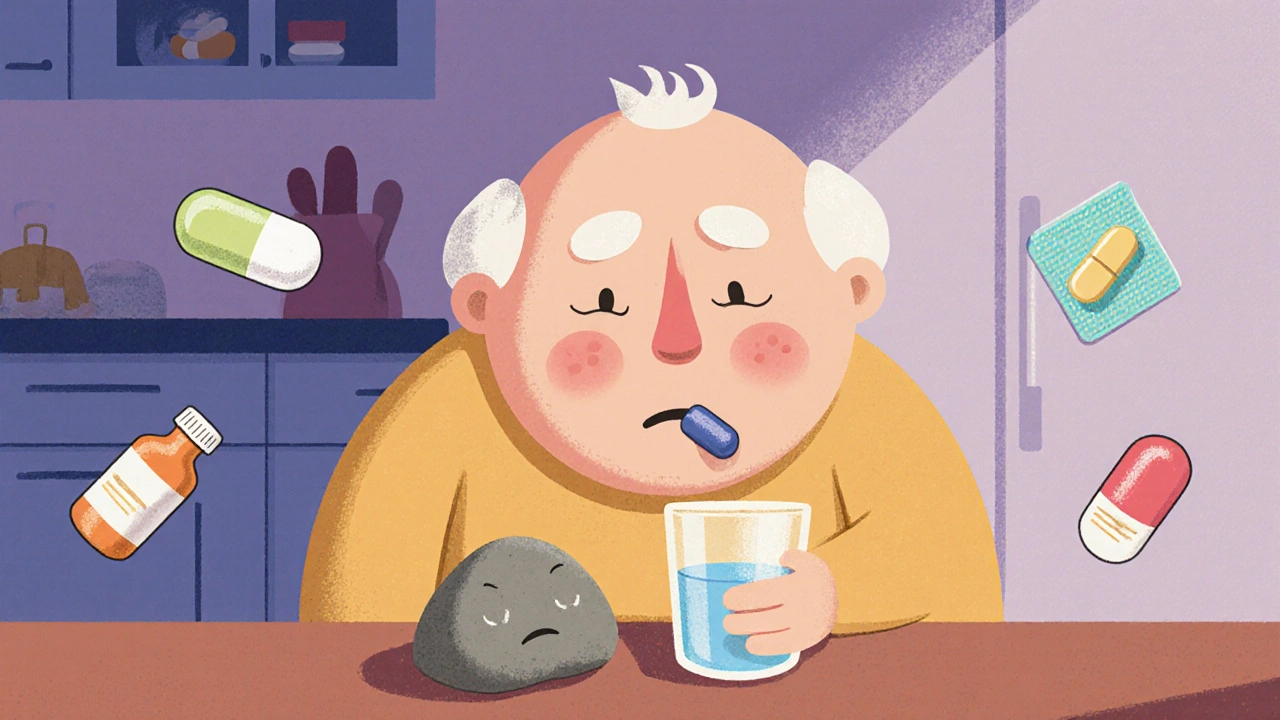Imagine taking your daily pills and feeling like they’re stuck in your throat. You gag. You panic. You spit them out. Then you feel guilty. This isn’t rare-it happens to 15% of older adults living at home, and up to 68% of nursing home residents. Swallowing difficulties, or dysphagia, aren’t just uncomfortable-they’re dangerous when they stop you from taking your medicine. Skipping doses because you can’t swallow pills leads to hospitalizations, worsening conditions, and even death. But there are real, safe ways to fix this-without risking your health.
Why Swallowing Pills Gets Harder with Age or Illness
It’s not just about being old. Swallowing is a complex process involving 25 muscles and 6 nerves. When you have stroke, Parkinson’s, dementia, ALS, or even severe acid reflux, those muscles weaken or misfire. Some people have narrow esophagus from surgery or radiation. Others just feel like their throat is tight. The result? Pills feel like rocks. Capsules stick. Liquids go down the wrong way.
And here’s the scary part: most people don’t tell their doctor. They think it’s normal. Or they’re embarrassed. But if you’re avoiding pills, your condition won’t improve. High blood pressure meds? Skipping them raises stroke risk. Diabetes pills? Missing doses spikes blood sugar. Antibiotics? Stopping early causes resistant infections.
Don’t Crush Pills Without Checking First
You’ve probably heard: “Just crush it and mix it with applesauce.” But this is one of the most dangerous myths in medication safety. In a 2023 study, 48% of crushed or opened medications were inappropriate. That’s nearly half. Why?
- Extended-release pills (like metformin ER, oxycodone CR) are designed to release slowly. Crush them, and you get a full dose all at once-risking overdose.
- Capsules with enteric coatings (like omeprazole) are meant to dissolve in the intestine, not the stomach. Crush them, and the drug gets destroyed by stomach acid.
- Some meds, like warfarin or levothyroxine, have very narrow therapeutic windows. Even small changes in absorption can cause bleeding or thyroid crashes.
The UK’s National Institute for Health and Care Excellence (NICE) says: altering pills should be a last resort. Always ask your pharmacist or doctor first. If you’re unsure, don’t guess. Call your pharmacy. There’s a free database called Lexicomp that pharmacists use to check if a pill can be crushed. Ask them to look it up.
Switch to Easier Forms-Before You Struggle
There are dozens of medications available in forms that don’t require swallowing a tablet. But most doctors never ask. You have to ask them.
- Liquid formulations: Many pills have liquid versions. Check for amoxicillin, sertraline, lisinopril, or metoprolol. Liquids are easier to measure and swallow, especially with a syringe.
- Orodispersible tablets: These dissolve on your tongue in seconds. Brands like Zofran (ondansetron) and Risperdal (risperidone) come this way. No water needed.
- Effervescent tablets: Dissolve in water to make a fizzy drink. Paracetamol (acetaminophen) and some vitamin B12 tablets come like this.
- Topical patches: For pain (fentanyl), hormone therapy (estradiol), or motion sickness (scopolamine), patches avoid the gut entirely.
- Rectal suppositories: For nausea, fever, or seizures, suppositories work fast and bypass the throat.
Here’s the catch: only 37% of essential medications have these alternatives. But that doesn’t mean you’re stuck. Ask your doctor: “Is there another form of this drug that doesn’t require swallowing?” Sometimes, switching brands or generics opens up options.

Use the Right Swallowing Techniques
If you must swallow a pill, how you do it matters. Most people just gulp water and hope. That rarely works well. Try these proven methods:
- The Lean Forward Method (best for capsules): Place the capsule on your tongue. Take a medium sip of water. Tilt your chin down toward your chest. Swallow. This uses gravity to guide the capsule down. Clinical studies show this improves success by 75%.
- The Pop Bottle Method (best for tablets): Put the pill on your tongue. Seal your lips around a plastic water bottle. Squeeze the bottle to create suction. The suction pulls the pill down with the water. Works better than just drinking.
- Chill it: Cold water numbs the throat slightly. Ice chips before swallowing can reduce gag reflex.
- Use thickened liquids: If you’re at risk of aspiration (inhaling food into lungs), use nectar-thick or honey-thick liquids. Thin water can slip into the windpipe. If you’re at risk of choking, thin liquids move faster and clear the throat better.
Speech therapists specialize in this. If you’re having trouble, ask your doctor for a referral. A 15-minute session can teach you techniques that work for your body.
Work With Your Care Team
No one person can fix this alone. You need a team.
- Your doctor: Should screen for swallowing problems during every check-up. If you’re over 65 or have neurological disease, they should ask: “Do you ever have trouble swallowing pills?”
- Your pharmacist: Can tell you if a pill can be crushed, if a liquid version exists, or if a different drug has the same effect with a better form.
- Your speech therapist: Can assess your swallowing, recommend safe textures, and teach you techniques.
- Your caregiver: Should never guess. If they’re giving you crushed pills, they need to know if it’s safe.
Many nursing homes and home care agencies still use outdated practices. A 2020 UK study found that staff often didn’t follow guidelines because no one trained them. Don’t assume they know. Ask: “Is this pill safe to crush?” Write it down. Show them the label.

New Tech Is Making It Easier
There’s hope on the horizon. Companies are developing new ways to deliver medicine without swallowing:
- Dissolvable films: Like VersaFilm, these stick to your cheek or under your tongue and dissolve in minutes. One 2023 study showed 85% adherence in patients with moderate dysphagia.
- Smart pill dispensers: Devices that remind you and dispense pre-measured doses in liquid or soft form.
- Improved labeling: The European Medicines Agency now requires labels to say if a pill can be crushed or split. Look for “Do not crush” or “May be dissolved in water.”
These aren’t everywhere yet-but they’re coming fast. Ask your pharmacist if any new forms are available for your meds.
What to Do Right Now
You don’t need to wait for new tech. Start today:
- Make a list of every medication you take. Write down the name, dose, and frequency.
- Call your pharmacy. Ask: “Which of these can I switch to a liquid, dissolvable, or patch form?”
- Ask your doctor: “Do I still need all these pills?” Sometimes, you can stop one or two.
- Practice the lean forward method with a piece of candy. Try it with a small M&M before moving to pills.
- If you’ve been crushing pills, stop. Call your pharmacist before you do it again.
Swallowing difficulties are common. But they’re not normal. And you don’t have to live with the fear of choking or the guilt of skipping your meds. There are safe, proven ways to take your medicine without pain. You just need to ask for them.
Can I crush my pills and mix them with food?
Only if your pharmacist or doctor says it’s safe. Many pills-especially extended-release, enteric-coated, or high-risk drugs like warfarin or levothyroxine-can become dangerous when crushed. Up to 48% of crushed medications are inappropriate, and some can cause overdose or loss of effectiveness. Always check before crushing.
Are liquid medicines less effective than pills?
No. Liquid versions are bioequivalent to pills-they deliver the same amount of drug into your bloodstream. The only difference is how they’re made. Some people absorb liquids faster, which can be helpful. But taste and storage can be issues. Always use the exact dose your doctor prescribed.
What if I can’t swallow anything at all?
If you truly can’t swallow, talk to your doctor about alternative routes: patches, suppositories, injections, or dissolvable films. For long-term care, feeding tubes may be needed-but only after all other options are explored. Never force food or pills. This risks aspiration pneumonia, which is life-threatening.
Why do some pills feel harder to swallow than others?
Size, shape, and coating matter. Smaller, torpedo-shaped pills and capsules with smooth coatings glide down easier. Large, round, or uncoated tablets are harder. Some pills have bitter tastes that trigger gag reflexes. If one pill is hard, ask your pharmacist if a different brand or form is available.
Can speech therapy help with swallowing pills?
Yes. Speech therapists are trained in swallowing mechanics. They can teach you specific techniques like the lean forward method, recommend safe food textures, and even do exercises to strengthen throat muscles. A single session can make a big difference. Ask your doctor for a referral.
Next Steps: What to Do If This Sounds Like You
If you or someone you care for struggles with swallowing pills:
- Don’t wait. Start the conversation with your doctor today.
- Bring your pill bottle list to your next appointment.
- Ask your pharmacist: “Which of these can be switched to a liquid or dissolvable form?”
- Try the lean forward method with a small candy before attempting pills.
- If you’ve been crushing pills, stop immediately and call your pharmacy.
Medication adherence isn’t about willpower. It’s about finding the right way for your body. You deserve to take your medicine safely-and you can. You just need to ask for help.


Denise Wiley
This post saved my life. My mom couldn't swallow her blood pressure pills for months-she’d just hide them. After trying the lean-forward trick with an M&M, she finally got through them without gagging. Now she takes everything like a champ. Thank you for not just listing options but giving real, doable steps.
Also, the part about not crushing pills? I had no idea. We were crushing her statin like it was cereal. We called the pharmacy yesterday and switched to liquid. No more panic at breakfast.
Sam txf
Let’s be real-pharmacies don’t care. They’ll sell you a 500mg tablet and shrug when you say you can’t swallow it. I’ve been begging for liquid metoprolol for two years. Finally found a compounding pharmacy that makes it. Cost $80 a month. Insurance said no. So I pay out of pocket. Because dying from high blood pressure isn’t an option.
Stop telling people to ‘ask their doctor.’ Doctors are just as clueless. You have to be the bulldozer.
And yes, the pop bottle trick works. I used it to swallow my first antidepressant. Still use it. No shame.
Maria Romina Aguilar
Wait-so you’re telling me that crushing pills isn’t just a myth, it’s a widespread, dangerous, unregulated practice that’s been happening for decades? And the system doesn’t have a single standardized warning label across all pharmacies? And no one’s sued anyone over this? And we’re still letting people do this?
...I’m not even mad. I’m just... impressed by the sheer incompetence.
Also, I’ve been crushing my levothyroxine since 2018. I think I’m fine. Maybe I’m not.
Also, I’m not calling anyone.
Also, I’m not changing anything.
Also, I’m not reading this again.
jaya sreeraagam
As someone from India where medicine access is a daily battle, I want to say this: in rural areas, we’ve been using crushed pills for generations because there’s no other option. Liquid forms? Rare. Dissolvable tablets? Never heard of them. We mix with honey, banana, or even jam.
But here’s what I learned: if the pill is coated, crushing it ruins it. If it’s extended-release, you’re in danger. I’ve seen elderly relatives collapse after crushing heart meds.
So yes-this guide is gold. But we need this in Hindi, Tamil, Bengali. We need community health workers trained in this. Not just in the US. Not just in rich countries. Everywhere.
Thank you for writing this. Please translate it. We’ll share it on WhatsApp groups. Millions need this.
Katrina Sofiya
I’m a geriatric nurse, and I’ve seen this exact scenario play out hundreds of times. Patients who are terrified of choking, ashamed to admit it, and too polite to push back. We need to normalize this conversation. It’s not ‘old age’-it’s a medical issue. Just like vision loss or hearing loss.
One of my patients started using the pop bottle method after I demonstrated it with a Tic Tac. She cried. Not from sadness-from relief. She said, ‘I thought I was the only one who couldn’t do this.’
You’re not alone. And you’re not broken. You just need the right tools. And now you have them.
Austin Simko
They’re putting drugs in films now? Sounds like the government’s next step. Soon they’ll be injecting nanobots into your cheek to track if you took your pill. And then they’ll raise your premiums if you didn’t.
Also, why is everyone so obsessed with swallowing? Why not just give us shots? Or inhalers? Or patches? Why make it so complicated?
Someone’s making money off this. I know it.
Nicola Mari
I’m shocked that anyone still thinks crushing pills is acceptable. This isn’t a parenting issue-it’s a medical emergency. And yet, we have entire nursing homes where staff do it routinely because ‘it’s easier.’
And the fact that patients don’t speak up? That’s not bravery. That’s silence born of fear and neglect. You’re not being ‘strong’ by suffering. You’re being exploited by a system that doesn’t care enough to provide alternatives.
And don’t even get me started on the lack of training for caregivers. It’s criminal.
George Hook
I’ve spent the last 18 months researching this after my father developed dysphagia post-stroke. What I found was staggering. There are over 200 medications with alternative formulations-but most physicians don’t know the list. Pharmacists know more, but they’re overworked and underpaid. And patients? They’re left to Google it at 2 a.m., terrified, alone.
There’s a gap here. Not just in access, but in education. We need mandatory training for all prescribers on pill-swallowing difficulties. We need a national database-like Lexicomp but public-facing-where you can search your medication and instantly see: ‘Available as liquid? Yes. Dissolvable? Yes. Patch? No. Crushable? Never.’
This post is a start. But it’s not enough. We need policy. We need funding. We need accountability.
And if you’re reading this and you’re a clinician? Please, for the love of everything holy, ask your patients: ‘Do you ever have trouble swallowing your pills?’ Don’t wait for them to say it. They won’t.
Olivia Gracelynn Starsmith
I used to crush my antidepressant because I couldn’t swallow pills. Then I read this and called my pharmacist. They said it was safe for mine. I switched to the liquid. Took me three days to get used to the taste. But now I take it every morning without thinking about it.
Also tried the lean forward trick with a small candy. Worked. Didn’t even need water.
It’s not magic. It’s just knowing how.
Thank you for not making me feel broken.
Evelyn Shaller-Auslander
I’m 72. Took my first pill at 18. Never had trouble until last year. Now I can’t swallow anything bigger than a vitamin. I cried the first time I used the pop bottle method. It felt like cheating. Like I was using a trick to do something basic.
But here’s the truth: I don’t care how I take my meds. I just want to live.
This post didn’t give me hope. It gave me a way. And that’s better.
kaushik dutta
As someone who works in global pharma logistics, I can confirm: the lack of alternative formulations in low-income markets isn’t due to technical limitations-it’s due to profit margins. Liquids cost more to produce. Patches require special packaging. Dissolvable films need cold-chain storage.
Big pharma doesn’t invest in these because the ROI is low. But the human cost? Astronomical.
We need global health policy to mandate formulation diversity for essential medicines. Not as a luxury. As a right.
And yes, the lean forward method works. I taught my grandmother. She now swallows her antihypertensives like a pro. But she shouldn’t have had to learn a circus trick to stay alive.
doug schlenker
I just want to say thank you. Not because you gave me new info (though you did). But because you didn’t judge. You didn’t say ‘just try harder.’ You didn’t say ‘it’s all in your head.’ You said: here’s how. Here’s what’s safe. Here’s who to ask.
That’s rare.
I’ve been avoiding my cholesterol meds for a year. I thought I was fine. Turns out I wasn’t. I’m calling my pharmacy tomorrow. I’m asking for liquid. I’m trying the lean forward trick.
And I’m not going to feel guilty anymore.
Skye Hamilton
I’ve been crushing my meds since I was 19. I don’t care what you say. I’ve been fine. My blood work’s normal. My doctor never said no. So why are you acting like I’m a criminal?
Also, I don’t trust ‘experts.’ They always change their minds. First it was fine. Now it’s dangerous? Who’s lying?
And why is everyone so obsessed with swallowing? Why not just inject me? Or implant a chip? Why make me feel like I’m failing at something so basic?
...I’m not changing anything.
But thanks for the guilt trip.
Brandon Trevino
The empirical literature on dysphagia-related non-adherence is unequivocal: a 2022 meta-analysis in the Journal of Clinical Pharmacology demonstrated a 3.2-fold increase in hospitalization rates among patients who altered pill formulations without professional guidance. Furthermore, pharmacokinetic variability in crushed extended-release formulations exceeds FDA’s 20% bioequivalence threshold in 78% of cases, rendering therapeutic efficacy unpredictable.
Moreover, the assertion that ‘liquid formulations are bioequivalent’ is misleading. While AUC and Cmax may be statistically equivalent, the rate of absorption in elderly patients with delayed gastric emptying often deviates significantly, particularly with lipophilic agents such as levothyroxine.
Recommendation: Utilize the Lexicomp database via institutional access, request a formal swallowing assessment from a speech-language pathologist certified in VFSS, and advocate for formulary substitution through your institution’s pharmacy and therapeutics committee. Do not rely on anecdotal methods. Evidence-based practice is not optional.
Hannah Magera
I’m a teacher and I’ve had three students’ grandparents come to me saying they can’t swallow pills. I didn’t know what to do. Now I’m sharing this post with everyone. I printed it out and gave copies to the local senior center.
One lady tried the lean forward trick with a jellybean. She laughed and said, ‘I feel like a kid again.’
That’s what this is. Not a medical guide. A reminder that we’re still human. We still need help. And asking for it isn’t weakness.
Thank you for writing this like you care.